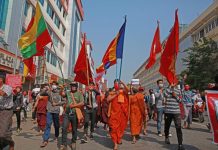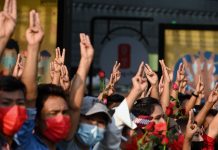
Following the military coup in Myanmar, businesses and analysts are expecting the country's economy to take damage.
Businesses claim that the military coup has already placed billions of foreign investment at risk and potentially damaging the economy of Myanmar. The US has already expressed the possibility of imposing additional sanctions on the country.
However, the potential US sanctions may only have limited impact on Myanmar, one of the poorest countries in Asia, since most of the investments into the country comes from Asia. According to the World Bank, the largest foreign investor in Myanmar is Singapore, comprising 34% of overall approved investment while Hong Kong was at second with 26%.
In the 2020 fiscal year ended September, Myanmar received Foreign Direct Investment (FDI) commitments amounting to $5.5 billion. Around 20% of these FDI commitments were in the real estate and manufacturing sectors.
These numbers are already forecast to decline this year due to the coronavirus pandemic.
Myanmar's military coup
The military took control of Myanmar in a coup on Monday and declared a state of emergency following the detention of civilian leader Aung San Suu Kyi and other leaders of the ruling National League for Democracy (NLD) party.
On Monday morning, people in Myanmar woke up to widespread internet and communications blackouts, closed banks, and military patrols in the city of Yangon. TV channels were seemingly blocked, with the military-owned Myawaddy TV channel the only one accessible to residents.
A news anchor on the TV channel announced that control of the entire country has been transferred to army chief Min Aung Hlaing. The military confirmed that it has detained Suu Kyi and other high ranking NLD leaders due to alleged voting irregularities in November’s election.
In that election, the NLD had an overwhelming win, taking 83% of the vote that granted the party another five years in government. Meanwhile, the military-backed Union Solidarity and Development Party won just 33 out of a possible 476 seats.
The coup was carried out just hours before the opening session of the new parliament.
A military spokesperson said last week that they are not ruling out if the allegations of voter fraud were not properly investigated and the military decided to take this into action, saying the political leaders were arrested for “failing to take action.”
Claims of voter fraud by the military have previously rejected by Myanmar’s election commission, pointing out that any errors, such as duplicated names on voter lists, were insufficient to influence the result of the vote.
The army chief’s office released a statement saying that elections will be conducted only after the election commission has been “re-constituted” and investigations were conducted on the voter lists.
The statement read: “A free and fair multiparty general election will be held and then, state responsibilities will be handed over to the winning party meeting norms and standards of democracy.”
Outlook for the economy
Vriens & Partners, a government affairs consultancy currently handling $3 billion to $4 billion worth of projects in energy, infrastructure and telecommunications for foreign clients investing in Myanmar, has a bleak outlook for the country.
The firm's managing partner Hans Vriens said: "That's all at risk now. This country has already been badly hit by Covid and by diminishing appetite to invest. And now we have this on top."
Vries thinks businesses may look to China as an alternative if sanctions significantly affect foreign investment, with Western and Japanese investors reconsidering investing in projects in Myanmar.
Stephen Lamar, president of the American Apparel & Footwear Association, mentioned that some of the group's members investing in the country have expressed concern about the coup.






